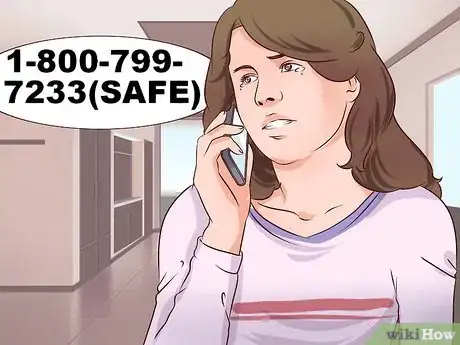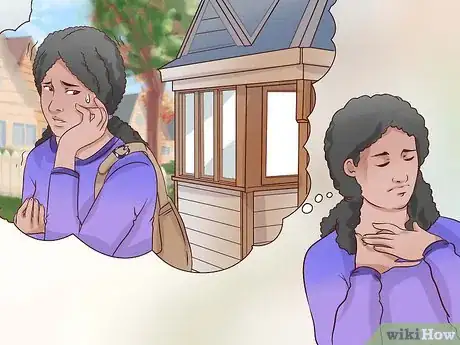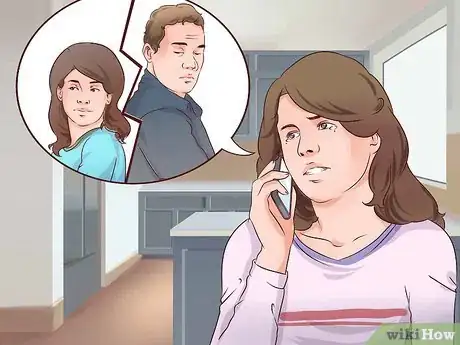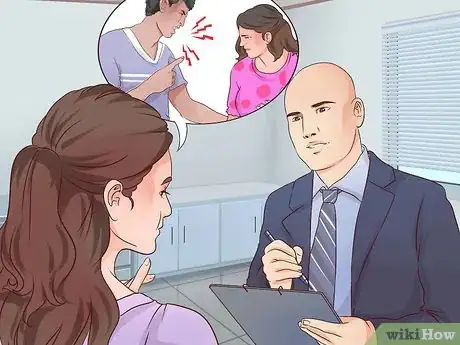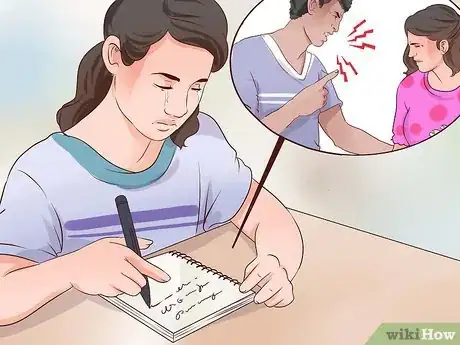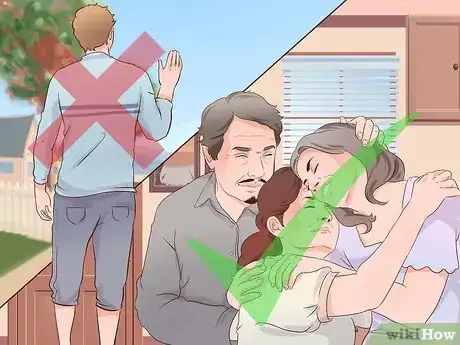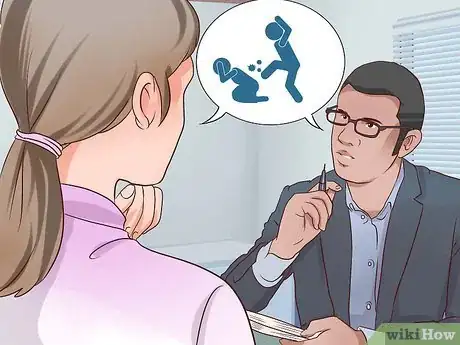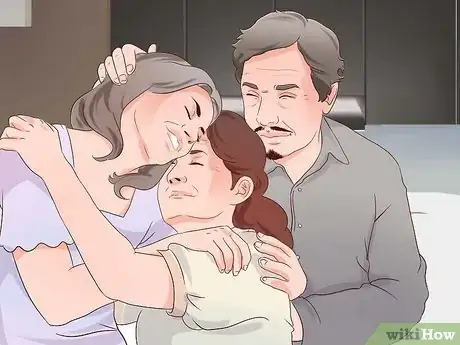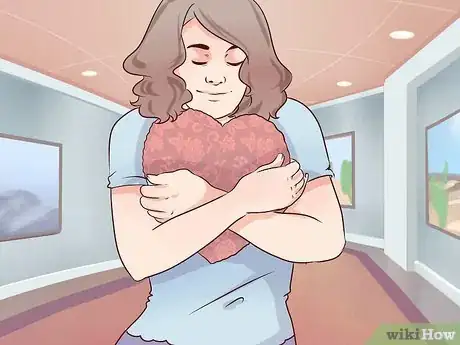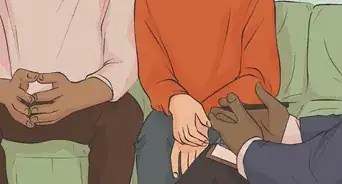This article was co-authored by Nicole Moore. Nicole Moore is a Love and Relationship Coach and the Founder and CEO of Love Works Method, a private coaching and digital course service for women looking to find the right partner. With over a decade of experience, she specializes in body language and helping others take control of their dating life, attract a partner, and build a strong relationship. Nicole has been featured in numerous publications such as Cosmopolitan, Forbes, and USA Today. She also hosts Love Works with Nicole Moore, a podcast for modern women wanting love, dating, and relationship advice. Nicole holds a BA in Public Relations and Spanish from Syracuse University and a Certificate in Personal Coaching from New York University.
This article has been viewed 238,387 times.
Abuse comes in many forms. Whether you've been manipulated emotionally, embarrassed repeatedly, berated, or otherwise humiliated by a boyfriend, you've endured emotional abuse. If you've ever been physically or sexually assaulted by a boyfriend, you've endured physical or sexual abuse. The only way to deal with an abusive boyfriend is to end the relationship as quickly as possible to keep yourself safe. Learn how to take immediate action and move on with your life.
Steps
Getting Away from Abuse
-
1Get help. There are often local resources to help victims of abuse. If you are not sure where to start, or if you just want to talk to someone about whether your relationship is abusive, try one of the following resources. If you live with your abusive boyfriend, be careful using your own home computer or your cellular phone, as your page visits and phone calls may be stored in the history or call log, which he may be monitoring.
- In the US: http://www.thehotline.org/ :The National Domestic Violence Hotline 1-800-799-7233(SAFE)
- In the UK: http://www.womensaid.org.uk/: Women's Aid 0808 2000 247
- In Australia: https://www.1800respect.org.au/: 1800Respect 1800 737 732
- Worldwide: http://www.hotpeachpages.net/: The International Directory of Domestic Violence Agencies
-
2Do not excuse or dismiss abusive behavior. It is very common for abusers to lead victims to believe that the abuse is the victim's fault. A boyfriend acting aggressive, violent, or manipulative towards you is not your fault. Know that your relationship can still be abusive, even if:
- Your boyfriend has never hit you. Emotional or verbal abuse is still abuse.[1]
- The abuse doesn't seem as bad as other instances of abuse you've heard about.[2]
- Physical violence has only happened once or twice. Any physical violence is a sign that more is possible.[3]
- The abuse stopped when you became passive, stopped arguing, or refrained from expressing your own thoughts or opinions.[4]
Advertisement -
3Form a plan to end the relationship immediately. Physical and emotional abuse should be considered a deal-breaker for a relationship. Regardless of your love for one another, how long you've been together, whether you have kids or pets, or whether you live together, a relationship that involves physical or psychological abuse needs to be over. Now. Start planning to end the relationship safely, as quickly as possible.[5]
- Think about where you're going to go when you leave.
- Know what you need to take with you. If necessary, pack an “emergency bag” and hide it somewhere so that it is ready to go when you are.[6]
- If you share a cell phone plan, remember that many phones have GPS tracking capability, and he may be able to find you or monitor you through your cell phone. Consider leaving it behind and getting a new phone and number.
- Decide what steps you need to take to stay safe after you leave. Do you need a restraining order? A new town? A new identity? New locks on your doors?
- Make a plan to keep others safe. Kids or pets might need to get out, too, and they may or may not be able to stay with you. Make a plan for dependents when you leave.
-
4End the relationship safely. You should make it clear that you are ending the relationship with no hope of restarting it in the future. If you feel uncomfortable or fear for your safety, you should end the relationship from a distance or have someone there to help you if the need arises.
- Do not try to end the relationship while you are at home alone with your abuser. Your attempt may cause his abuse to escalate, and you might be putting yourself in serious danger.
- Consider breaking up in writing or over the phone, even if that's not how you would normally break up; your safety is more important than social graces.
- If you feel you must break up with an abusive boyfriend face to face, do it in public, with other people present, and keep the conversation brief.
- Be short and to-the-point. You can say something simple like, “we cannot be together anymore.” Try to avoid any phrases like “right now,” “at this time,” or “until you change.” You should close the door fully on the relationship.
Staying Safe
-
1Contact the authorities. As soon as you secure your physical security, it's important that you speak with the authorities and move forward with legal action, or at least explore your options. You should know how to proceed legally and learn about safety precautions from the police. Ensure that your abuse will end.
- As soon as possible, you should get in touch with a domestic abuse counselor and learn about your options moving forward. Depending on your situation and the length of your relationship, it may be difficult to get a new job, a new apartment, or make the other big changes this might require. Domestic abuse counselors can help.
-
2Document your abuse. Keep records of any attempts that your partner takes to get in touch with you after breaking up. Write down a description of events that happen in person or on the telephone, and keep any physical evidence such as emails, social media messages, or text messages.
- You need to document all of the correspondence that you receive, particularly if it contains threats of violence. If you are able to, you should document any physical abuse that happened while you were with the abuser or that he inflicts after the breakup.
- This is an essential part of building a legal case against your abuser and it may help in the event that you need a restraining order.
-
3File a restraining order. A restraining order (also known as a personal protection order)allows you legal protection from a past abuser. Take any and all evidence of abuse you have as well as a letter describing the abusive situation and the relationship between you and your abuser to your local courthouse. They should provide you with further instructions about how to fill out the appropriate paperwork to get a restraining order.
- If the court approves your restraining order, it will need to be legally served to your abuser. After it has been served, you will file a proof of service with the court. Talk to the clerk at the courthouse about how to do this.
- Keep a copy of your restraining order with you all the time so that you can show it to the police if necessary. You never know where you will be when and if your abuser decides to violate the order.
- Be aware that a restraining order does not guarantee your protection.[7] It makes it easier to have your abuser arrested in the event of further incidents, but it may do little to keep a violent abuser away from you completely.
-
4Don't offer a second chance. Enough is enough. Once you break up, don't go back, attempt to contact, or reconcile with your partner. It's over. Let your abuser get the message with the restraining order paperwork.
- If you've suffered abuse, there's nothing to discuss. Don't listen to any negotiation, any apologies, any promises that your boyfriend will "never do this again." Abuse breaks the deal. Abuse ends a relationship.
-
5Make changes in your routine. When you're first getting started, try and avoid coming in contact with your abuser. Avoid places that you know he frequents and change your own routine so that he won't necessarily know where you are at all times.[8] There's no reason to force an awkward or potentially dangerous situation.
- If you go to school with your abuser, or work with your abuser, or otherwise see him frequently, try to ignore his presence as much as possible. Try and walk with others at all times, when you're going to and from work or your car. You can also talk to your boss, the HR department, or a school counselor about changing your work location, work hours, or class schedule to keep yourself safe.
Moving On
-
1Reclaim your own life. It's common for victims of domestic abuse to feel as though they have brought the abuse upon themselves. This is due to the manipulation of their abusers; no one is responsible for bring abuse on themselves.[9] After the abuse has ended, work on building yourself back up from the place that you were in the abusive relationship.
- Seek therapy to work on your self-confidence.
- Rely on friends and family to rebuild your social connections.
- Seek healthy new relationships that are entirely without abuse.[10]
-
2Make an appointment with a domestic violence counselor. It's critically important that you talk to someone that understands the psychological trauma of abuse and the spells that can be cast by some abusers. Seek out a local domestic violence support group and attend as soon as possible to begin the process of healing.
-
3Let yourself be angry. It might take a while for it to come on, but there's likely a hidden well of anger hiding somewhere beneath the other emotions. Anger isn't bad; it can be a catalyst for change.[11] If anger overtakes you, let it happen, and channel your rage into productive energy-spending activities. Go running. Hit a heavy bag. Take yoga. Sweat your rage out.
- Be careful not to translate your anger into risky or self-destructive behaviors, and try to process it safely.
-
4Focus on building yourself back up. Abuse chips away at your defenses until you're left exposed and raw. It can be a long process of building yourself back up into the unique, lovable, interesting person that you are and that you deserve to be.
- Let yourself mourn for a time, and then get busy. With any break up, you may want to spend a week in bed, unable to do much but be depressed. That's ok, but it's also important to recognize when it's time to get out of bed and start moving on.
- Try to avoid focusing too much on ideas about lost time and regret. You took an important step in ending your relationship and moving forward. Just be glad you didn't spend more time with the person, or get locked into a never-ending cycle of abuse. Look forward to the future.
-
5Spend time with loved ones. Make a list of the people in your life who really care about you. Think about the people who've supported you time in and time out, the people who've loved you, deeply, and lifted you up through your toughest times. Family, life-long friends, trusted neighbors, these are the people who you need to spend time with now. Let yourself lean on them.
-
6Be kind to yourself. It may be a while since you've been able to relax, to spend time with your close family members, or been able to do little things without the fear that they'll set off your angry boyfriend into spirals of abuse. It might take some time, but gradually start letting go of that fear and guilt associated with your abuse relationship, and find life fun again.
Expert Q&A
-
QuestionWhat is considered abusive behavior?
 Nicole MooreNicole Moore is a Love and Relationship Coach and the Founder and CEO of Love Works Method, a private coaching and digital course service for women looking to find the right partner. With over a decade of experience, she specializes in body language and helping others take control of their dating life, attract a partner, and build a strong relationship. Nicole has been featured in numerous publications such as Cosmopolitan, Forbes, and USA Today. She also hosts Love Works with Nicole Moore, a podcast for modern women wanting love, dating, and relationship advice. Nicole holds a BA in Public Relations and Spanish from Syracuse University and a Certificate in Personal Coaching from New York University.
Nicole MooreNicole Moore is a Love and Relationship Coach and the Founder and CEO of Love Works Method, a private coaching and digital course service for women looking to find the right partner. With over a decade of experience, she specializes in body language and helping others take control of their dating life, attract a partner, and build a strong relationship. Nicole has been featured in numerous publications such as Cosmopolitan, Forbes, and USA Today. She also hosts Love Works with Nicole Moore, a podcast for modern women wanting love, dating, and relationship advice. Nicole holds a BA in Public Relations and Spanish from Syracuse University and a Certificate in Personal Coaching from New York University.
Love & Relationship Coach Abuse in relationships can be emotional, mental, or physical. A common warning sign is when your partner makes you feel worthless, insecure, and like no one else would want you. Very often, abusers belittle their partners with subtle or obvious criticism to break down their partner's confidence so they won't leave.
Abuse in relationships can be emotional, mental, or physical. A common warning sign is when your partner makes you feel worthless, insecure, and like no one else would want you. Very often, abusers belittle their partners with subtle or obvious criticism to break down their partner's confidence so they won't leave. -
QuestionWhat are examples of abuse?
 Nicole MooreNicole Moore is a Love and Relationship Coach and the Founder and CEO of Love Works Method, a private coaching and digital course service for women looking to find the right partner. With over a decade of experience, she specializes in body language and helping others take control of their dating life, attract a partner, and build a strong relationship. Nicole has been featured in numerous publications such as Cosmopolitan, Forbes, and USA Today. She also hosts Love Works with Nicole Moore, a podcast for modern women wanting love, dating, and relationship advice. Nicole holds a BA in Public Relations and Spanish from Syracuse University and a Certificate in Personal Coaching from New York University.
Nicole MooreNicole Moore is a Love and Relationship Coach and the Founder and CEO of Love Works Method, a private coaching and digital course service for women looking to find the right partner. With over a decade of experience, she specializes in body language and helping others take control of their dating life, attract a partner, and build a strong relationship. Nicole has been featured in numerous publications such as Cosmopolitan, Forbes, and USA Today. She also hosts Love Works with Nicole Moore, a podcast for modern women wanting love, dating, and relationship advice. Nicole holds a BA in Public Relations and Spanish from Syracuse University and a Certificate in Personal Coaching from New York University.
Love & Relationship Coach Extreme, volatile emotions are a common example. For instance, a partner might get angry at you for the little things, yell, scream, or make everything your fault.
Extreme, volatile emotions are a common example. For instance, a partner might get angry at you for the little things, yell, scream, or make everything your fault. -
QuestionHow can you tell if a person is abused?
 Nicole MooreNicole Moore is a Love and Relationship Coach and the Founder and CEO of Love Works Method, a private coaching and digital course service for women looking to find the right partner. With over a decade of experience, she specializes in body language and helping others take control of their dating life, attract a partner, and build a strong relationship. Nicole has been featured in numerous publications such as Cosmopolitan, Forbes, and USA Today. She also hosts Love Works with Nicole Moore, a podcast for modern women wanting love, dating, and relationship advice. Nicole holds a BA in Public Relations and Spanish from Syracuse University and a Certificate in Personal Coaching from New York University.
Nicole MooreNicole Moore is a Love and Relationship Coach and the Founder and CEO of Love Works Method, a private coaching and digital course service for women looking to find the right partner. With over a decade of experience, she specializes in body language and helping others take control of their dating life, attract a partner, and build a strong relationship. Nicole has been featured in numerous publications such as Cosmopolitan, Forbes, and USA Today. She also hosts Love Works with Nicole Moore, a podcast for modern women wanting love, dating, and relationship advice. Nicole holds a BA in Public Relations and Spanish from Syracuse University and a Certificate in Personal Coaching from New York University.
Love & Relationship Coach A lot of times the abusive partner will try to isolate their partner and keep them away from their family and friends. If you feel like a person is keeping their partner all to themselves, that partner could be in abusive relationship.
A lot of times the abusive partner will try to isolate their partner and keep them away from their family and friends. If you feel like a person is keeping their partner all to themselves, that partner could be in abusive relationship.
Warnings
- Do not feed into his panic attacks or distress. Just react calmly or leave him.⧼thumbs_response⧽
- Be sure to provide recovery care for abused children as well.⧼thumbs_response⧽
- Make sure you, your friends, and your family keep their distance from him.⧼thumbs_response⧽
References
- ↑ Nicole Moore. Love & Relationship Coach. Expert Interview. 6 October 2021.
- ↑ http://www.helpguide.org/articles/abuse/domestic-violence-and-abuse.htm
- ↑ http://www.helpguide.org/articles/abuse/domestic-violence-and-abuse.htm
- ↑ http://www.helpguide.org/articles/abuse/domestic-violence-and-abuse.htm
- ↑ http://www.northwestern.edu/womenscenter/issues-information/relationship-violence/warning-signs-abusive-person.html
- ↑ http://www.helpguide.org/articles/abuse/help-for-abused-and-battered-women.htm
- ↑ http://www.helpguide.org/articles/abuse/help-for-abused-and-battered-women.htm
- ↑ http://www.helpguide.org/articles/abuse/help-for-abused-and-battered-women.htm
- ↑ http://www.helpguide.org/articles/abuse/domestic-violence-and-abuse.htm
About This Article
An abusive boyfriend can make you feel scared to do anything, but the only way you can put an end to it and stay safe is by getting out of the relationship. Decide where you’ll go when you leave, like a friend’s place or your family home. If you feel like you have nobody to turn to, contact a domestic abuse service in your area. For example, use the National Domestic Violence Hotline in the United States or Women’s Aid in Britain. You’ll also need to pack an emergency bag with basic supplies, including clothes and toiletries, so you can leave quickly at the right moment. Once you’ve reached somewhere safe, tell your boyfriend that you’re ending the relationship. This should be done by phone from a distance or in a public place with others present, since ensuring your safety is the most important thing. For tips from our Relationship co-author on how to file a restraining order, keep reading.
